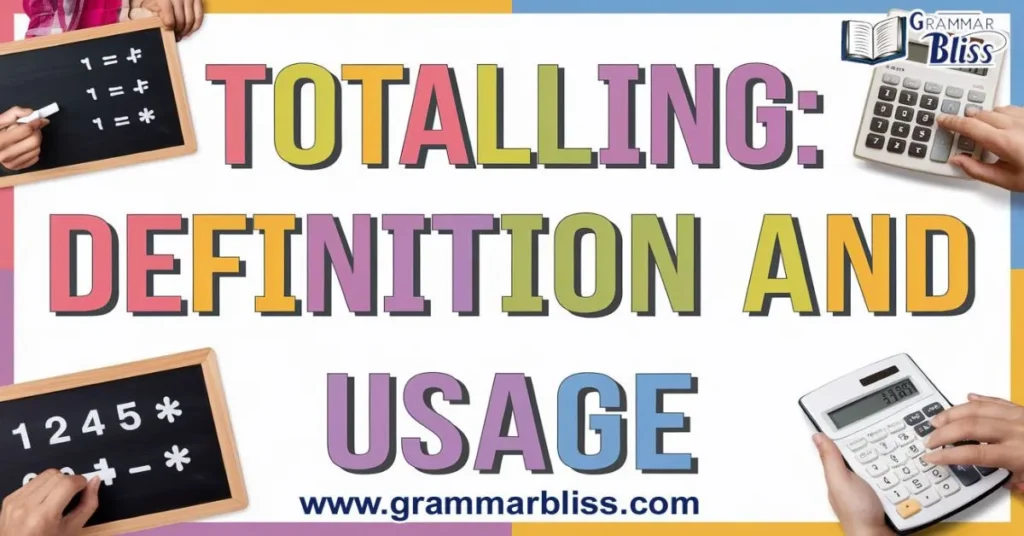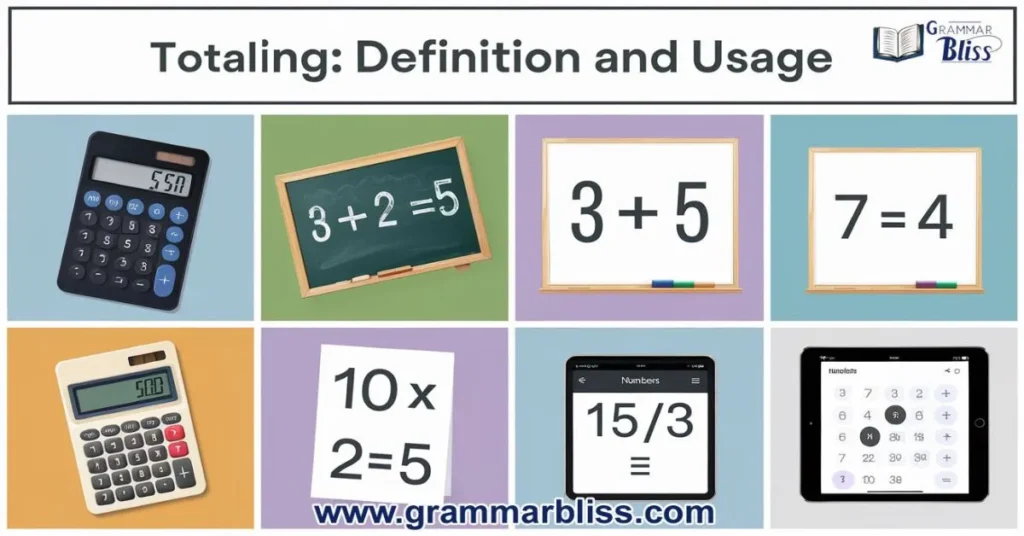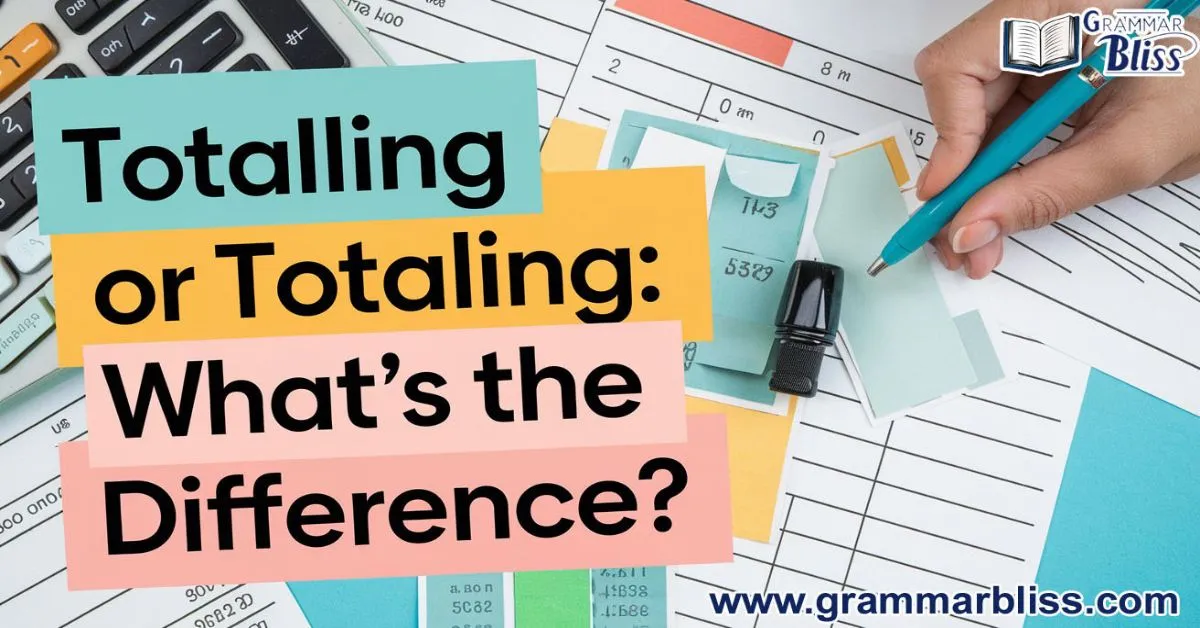Totalling or Totaling-which one is correct? This spelling difference often confuses writers, especially when switching between British English and American English. In British English, “totalling” (with a double “l”) follows the traditional spelling rule of doubling the final consonant before adding “-ing.”
Meanwhile, in American English, “totaling” (with a single “l”) is preferred, as it aligns with simplified spelling conventions. Understanding these variations is crucial for maintaining consistent spelling in your writing.
Whether you’re drafting a business report or an academic paper, knowing when to use “totalling” or “totaling” ensures clarity and linguistic accuracy. Let’s explore the rules behind these spellings and how they fit into English grammar norms.
Quick Summary
Many English learners and even native speakers often get confused about whether to use “totalling” or “totaling.” The spelling difference depends on the region where English is used. In British English, the correct spelling is “totalling” with a double consonant before adding “-ing.” In American English, the word is spelled as “totaling”, following the spelling conventions that prefer a single consonant.
Understanding UK vs US spelling is important for writing consistency, whether you’re preparing an academic paper, business document, or casual text. The double consonant rule is a key grammar rule that affects not just this word but many others in English vocabulary differences.
Understanding Totalling or Totaling
Both totalling and totaling come from the root word “total”, which means to add up or sum something. However, due to English language variations, words ending in a single vowel followed by a consonant behave differently in different regions.
The British English spelling follows the rule that if a word ends with a vowel + consonant, and the stress is on the final syllable, the final consonant is doubled before adding “-ing.” This is why words like “totalling,” “travelling,” and “cancelling” have two Ls in the UK.
In contrast, American English spelling follows a simpler rule, where the final consonant is not doubled unless the word has only one syllable or ends in a stressed short vowel sound. This is why “totaling,” “traveling,” and “canceling” are spelled with one L in the US. These spelling rules reflect broader language differences between the two variants of English.
Learn more: soo-or-so-whats-the-difference/
Totalling: Definition and Usage

In British English words, “totalling” means adding up a sum or reaching a total amount. This form follows the British spelling norms, where words ending in a vowel + consonant typically double the consonant before adding a suffix.
For Example:
- “The expenses are totalling £5,000 this month.”
- “The votes are still totalling in the final count.”
The Oxford spelling guide and Chicago Manual of Style both recognize “totalling” as correct for British publications, academic writing, and formal British English grammar.
Synonyms for Totalling
- Summing up
- Calculating
- Adding together
- Counting up
- Reckoning
Totaling: Definition and Usage

In American English words, “totaling” is the correct form, with just one L. This follows American spelling standards, which simplify spelling by avoiding unnecessary consonant doubling.
Example sentences in American English grammar:
- “The damage is totaling over $10,000.”
- “Our monthly sales are totaling more than expected.”
Following AP Stylebook rules and formal writing guidelines, “totaling” should always be used in business writing standards, legal documents, and official American publications.
Synonyms for Totaling
- Summing
- Computing
- Accumulating
- Aggregating
- Tallying
Explore further: choosing-or-chosing-which-one-is-correct/
Side-by-Side Comparison
Here’s a table that highlights the spelling differences between totalling or totaling and their writing conventions.
| Feature | Totalling (British English) | Totaling (American English) |
| Grammar rule | Double L before adding “-ing” | Single L before adding “-ing” |
| Writing standardization | Used in the UK, Canada, Australia | Used in the USA |
| Example sentence | “She is totalling the expenses.” | “She is totaling the expenses.” |
| Spelling guide | Oxford English Dictionary | Merriam-Webster Dictionary |
| Common in | British publications, UK schools | American newspapers, business reports |
Everyday Usage Examples
Totalling in British English
- “The shop’s revenue is totalling £3,000 this week.”
- “Our expenses are totalling more than expected.”
Totaling in American English
- “The damages are totaling around $2,500.”
- “The votes are totaling up to 1,000.”
Grammar Rules and Examples
To better understand British vs American writing, let’s look at more word spelling differences based on grammar rules.
Examples of other words that follow the same rule:
| British English Spelling | American English Spelling |
| Travelling | Traveling |
| Cancelling | Canceling |
| Modelling | Modeling |
| Fuelled | Fueled |
| Labelled | Labeled |
These vocabulary distinctions show how spelling preferences differ based on region.
See more: to-short-or-too-short/
FAQ’s: Totalling or Totaling
Which spelling is correct in the USA?
In the USA, “totaling” is correct. Using “totalling” in American writing may be seen as incorrect.
Why do British spellings double the ‘L’?
The double consonant rule applies when the final syllable is stressed, requiring a double L before “-ing.”
Is it incorrect to use “totalling” in America?
Yes, in American writing standards, “totalling” would be considered a common spelling error.
Does one spelling sound more formal?
No, both are equally formal; the choice depends on the writing convention used in that region.
Are there other words like totalling and totaling?
Yes, words like “travelling/traveling”, “cancelling/canceling”, and “modelling/modeling” follow the same pattern.
Conclusion
Understanding the difference between totalling or totaling is crucial for correct English spelling based on regional usage. In British English, the spelling totalling follows the double consonant rule, while in American English, totaling is preferred due to simplified spelling conventions. Knowing these grammar rules ensures writing consistency in both formal writing and everyday communication. Whether you follow British English spelling or American English spelling, using the correct form enhances clarity. Always consider your audience to maintain proper spelling and ensure professional, error-free writing across different regions.

